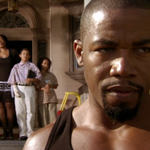 Hello! I’m periodically rolling out these Profiles in Badass columns from earlier this year that I’m sure many of you didn’t see in their original presentation behind a pay (and arguably ethics) wall on Rebeller. They’re written for a more general audience than outlawvern.com, so they might be pretty basic to some of you, but I think I did a good job putting a finger on the greatness of my various subjects.
Hello! I’m periodically rolling out these Profiles in Badass columns from earlier this year that I’m sure many of you didn’t see in their original presentation behind a pay (and arguably ethics) wall on Rebeller. They’re written for a more general audience than outlawvern.com, so they might be pretty basic to some of you, but I think I did a good job putting a finger on the greatness of my various subjects.
For this one it’s important to know that Rebeller was owned by Cinestate, producers of Dragged Across Concrete, and I knew they’d want me to mention MJW’s part in that movie. But I have, you know, complicated feelings about it. They swore they wanted a diversity of viewpoints, and I figured this was a good opportunity to test their sincerity, so I didn’t hold back. To their credit I got no complaints, and the editor later mentioned that he liked me “trolling” them like that when I was arguing with him about something else. Anyway, I’m proud of this one.
PROFILES IN BADASS #2: MICHAEL JAI WHITE
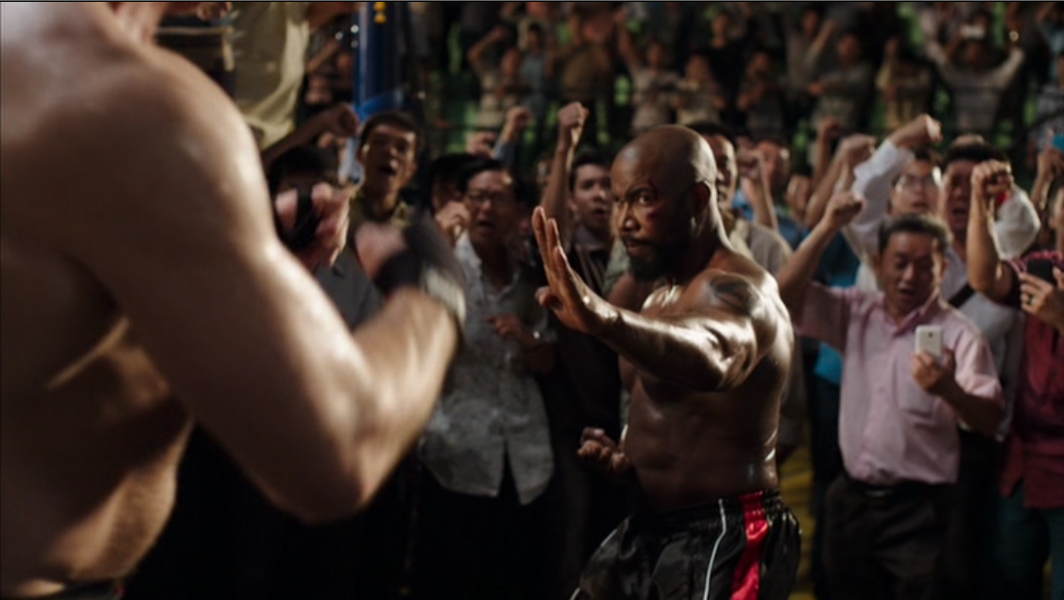
With his deep voice, muscular physique and lifetime of training in eight martial arts styles, it would be easy for Michael Jai White to get stuck in certain types of roles – gangsters, henchmen, soldiers, cops. And he’s done those. Some Rebeller readers may only know him for getting a knife in the mouth from the Joker in The Dark Knight, or for playing the partner-in-crime to sort-of-protagonist Henry in Dragged Across Concrete. That character is named “Biscuit” and about all we know about him is that he liked dinosaurs as a kid; I think we learn more about the bank teller who gets killed, and arguably the egg salad sandwich that Anthony eats. Yet White gives a memorably searing performance, particularly as he drives the escape van and seethes about how they’re treating the hostages in the back.
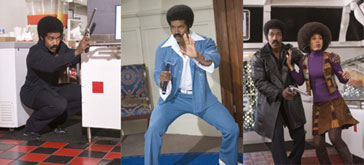 He can bring unexpected depth to characters like that, but he’s not opposed to goofing around. He’s shown an aptitude for comedy in Tyler Perry’s Why Did I Get Married movies (2007 and 2010), the Elmore Leonard adaptation Freaky Deaky (2012), and most notably the great 2009 blaxploitation parody/homage Black Dynamite, which he also conceived and co-wrote. Black Dynamite weaponizes White’s oversized swagger mostly for laughs – unlike, say, Undercover Brother or Austin Powers, the joke is that he actually is as amazing as he thinks he is. But he has some genuine Jim Kelly style fight scenes and “oh shit” moments like walking over to flip the sign on the door to “Closed” before taking on everyone inside the pool hall.
He can bring unexpected depth to characters like that, but he’s not opposed to goofing around. He’s shown an aptitude for comedy in Tyler Perry’s Why Did I Get Married movies (2007 and 2010), the Elmore Leonard adaptation Freaky Deaky (2012), and most notably the great 2009 blaxploitation parody/homage Black Dynamite, which he also conceived and co-wrote. Black Dynamite weaponizes White’s oversized swagger mostly for laughs – unlike, say, Undercover Brother or Austin Powers, the joke is that he actually is as amazing as he thinks he is. But he has some genuine Jim Kelly style fight scenes and “oh shit” moments like walking over to flip the sign on the door to “Closed” before taking on everyone inside the pool hall.
As much as I like all these films and admire those facets of his talent, it’s Michael Jai White the star of traditional action movies that most appeals to me, and that’s what we’re going to talk about today.
In the old days there were action stars. Athletes, martial artists and bodybuilders who turned themselves into icons, brand names, personal guarantees of a certain type of entertainment based around their personalities and physical abilities. Stallone and Schwarzenegger turned their bodies, faces and personas into some of America’s greatest exports. For a time, Chuck Norris, Jean-Claude Van Damme and Steven Seagal built on the traditions of Asian martial arts films, sometimes merged with cop movies or sci-fi, rising from b-movies and programmers to wide release studio offerings (and back). Others, like Don “The Dragon” Wilson and Cynthia Rothrock, helped lower budget versions of such films proliferate on home video, their names and faces making more of an impression than any of the individual titles.
White was still coming up in those days. He’d held dozens of karate titles and had bit parts in Van Damme’s Universal Soldier, Jerry Trimble’s Full Contact and Wilson’s Ring of Fire 3 (plus The Toxic Avenger II and III and Teenage Mutant Ninja Turtles II) when he was chosen from over a thousand hopefuls in an open casting call to star as Mike Tyson in a 1995 HBO biopic. “Michael Jai White almost makes Tyson likable,” wrote Steve Nidetz in the Chicago Tribune.
White found his first marquee role as Spawn (1997), a fitting (if cheesy) use of his larger-than-life straight-out-of-a-comic-book qualities, but one that mostly kept him hidden behind thick latex necroplasm. He played villains opposite Van Damme (Universal Soldier: The Return) and Seagal (Exit Wounds) as their careers in theatrically released films were winding down. But he didn’t achieve the type of widespread recognition that leads to a series of action vehicles – of Michael Jai White movies.
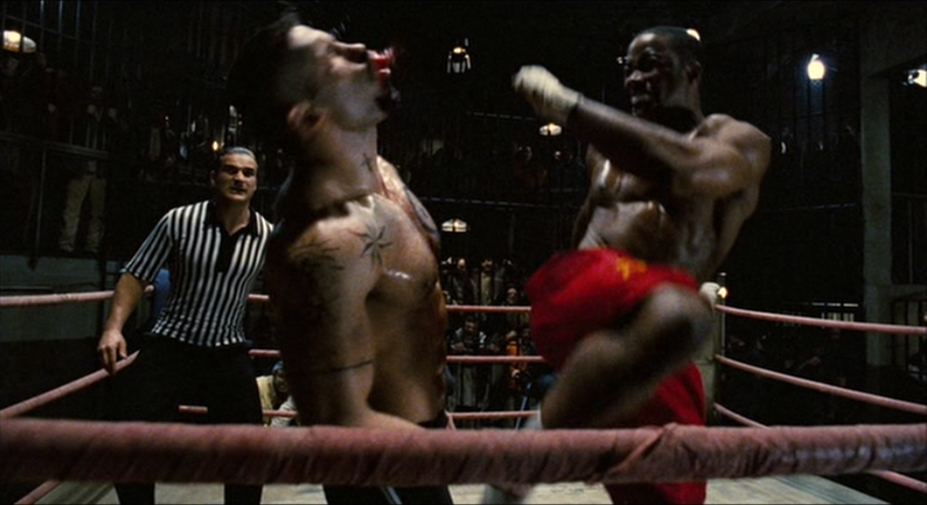
That is, not until 2006, through the unlikely means of a direct-to-video sequel to a lesser-known prison boxing film. In Undisputed II: Last Man Standing White replaces Ving Rhames as the villain from the 2002 Walter Hill original. Still an asshole, but now the protagonist, he’s framed in Russia and forced to fight the champion Uri Boyka (a breakout role for Scott Adkins, who became the protagonist for two excellent sequels). Coming from one of DTV action’s best directors, Isaac Florentine, and with choreography by J.J. Perry (Warrior, Haywire), it expertly employs all the most satisfying prison and fight tournament tropes in the service of hard-hitting, acrobatic fights that put all the quick-cut, shaky-cam theatrical bullshit of the era to shame.
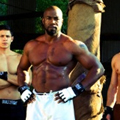 In this low budget, small-screen, meat-and-potatoes genre work, White is really allowed to shine. In 2011 he sequelized another obscure theatrical release with his directorial debut, Never Back Down 2: The Beatdown. He’s also in front of the camera, stealing this silly teen movie take on underground fighting tournaments as Case Walker, a disgraced MMA star and ex-con turned reluctant fight trainer. When the protagonists first approach his trailer he calls them bitches and chases them away. But he agrees to teach them in exchange for “blood, sweat and money,” plus a twenty pound sack of potatoes.
In this low budget, small-screen, meat-and-potatoes genre work, White is really allowed to shine. In 2011 he sequelized another obscure theatrical release with his directorial debut, Never Back Down 2: The Beatdown. He’s also in front of the camera, stealing this silly teen movie take on underground fighting tournaments as Case Walker, a disgraced MMA star and ex-con turned reluctant fight trainer. When the protagonists first approach his trailer he calls them bitches and chases them away. But he agrees to teach them in exchange for “blood, sweat and money,” plus a twenty pound sack of potatoes.
There’s a scene where police plant a gun on him and try to beat him with clubs, and instead he kicks the shit out of them while still handcuffed. It’s a cathartic fantasy for an age of frequent police brutality, filmed a few years before Trayvon Martin, Michael Brown and #BlackLivesMatter. Try dragging Case Walker across concrete – I dare you. White returned as director and graduated to main character in 2016’s Never Back Down: No Surrender.
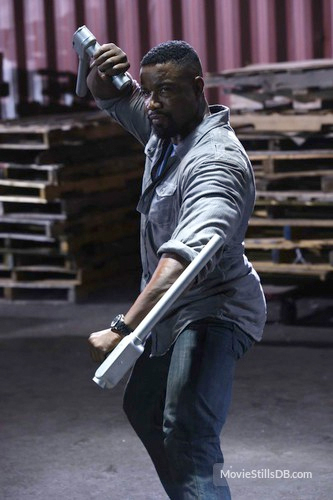 Falcon Rising (2014) failed to kickstart a planned franchise, but it’s a solid depressed-ex-Marine-goes-vigilante-in-Rio movie where he gets to fight a Yakuza swordsman using pipes as tonfa. The Hard Way (2019) has clunkier filmmaking and a more ridiculous story, but – just like the old days – it gets by purely on the tough guy charisma, humor and fighting skills of its star. White plays an ex-Special Forces jazz club owner and chess enthusiast investigating the death of his guitarist/cop brother. In one scene he rips a guy’s ear off in the VIP room at a strip club and then yells at the guy for not taking it with him when he leaves. He’s so overpowering that he tries to convince his nephew he’s not a fighter because “Fighting is the violent exchange of physical blows. It’s technically not a fight if I’m the only one giving blows.”
Falcon Rising (2014) failed to kickstart a planned franchise, but it’s a solid depressed-ex-Marine-goes-vigilante-in-Rio movie where he gets to fight a Yakuza swordsman using pipes as tonfa. The Hard Way (2019) has clunkier filmmaking and a more ridiculous story, but – just like the old days – it gets by purely on the tough guy charisma, humor and fighting skills of its star. White plays an ex-Special Forces jazz club owner and chess enthusiast investigating the death of his guitarist/cop brother. In one scene he rips a guy’s ear off in the VIP room at a strip club and then yells at the guy for not taking it with him when he leaves. He’s so overpowering that he tries to convince his nephew he’s not a fighter because “Fighting is the violent exchange of physical blows. It’s technically not a fight if I’m the only one giving blows.”
Any of these are good viewing for straight-ahead action fans, as are some of White’s supporting player gigs. It’s cool to see him fight Tony Jaa in Dolph Lundgren’s Skin Trade (2014), and reunite with Adkins in both Accident Man (2018) and Triple Threat (2019).
But for my money the quintessential Michael Jai White film is Blood and Bone (2009), directed by Ben Ramsey. White plays a fresh-from-prison mystery man who joins an L.A. street fighting circuit in what turns out to be a revenge mission. The high flying, bone-crunching fights choreographed by Larnell Stovall (Universal Soldier: Day of Reckoning) are shot with energy and style, and the character is peak MJW, running through enemies like a battering ram, though he could probably incapacitate them with a dirty look.
It also has a great sadistic gangster villain (Eamonn Walker) who loves Genghis Khan quotes and samurai swords. In one of many memorable scenes he starts a Wang Chung sing-a-long just to catch a guy off guard when he stabs him. Odder still, there’s a brief cameo by martial arts legend Bob Wall as his character O’Hara from Enter the Dragon. And I’m okay with it taking place in the same universe. Blood and Bone is a stone cold action classic, and one of the purest of its era.
That was ten years ago, and though White’s work has continued to be steady, it has rarely been shown in theaters, and has never been much higher profile than playing Bronze Tiger on Arrow. Here’s hoping some of his future movies – perhaps through his production company Jaigantic Studios, currently in production on a Black Dynamite style western called The Outlaw Johnny Black – will be able to properly showcase the unadulterated power of MJW.


























September 3rd, 2020 at 12:13 pm
Thanks for posting these, Vern. I was always curious about how you’d present yourself to a readership that has seemingly dedicated itself to the opposite of everything you stand for. How did the commenters react to this piece, by the way?
Also, does anybody know what’s up with Cinestate? Did they really just close up shop altogether? Not that I’m complaining, really, but I thought they’d put up more of a fight than this.